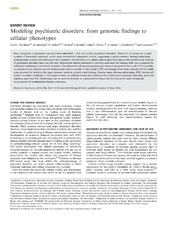| dc.contributor.author | Falk, Anna | en_US |
| dc.contributor.author | Heine, Vivi M. | en_US |
| dc.contributor.author | Harwood, Adrian J. | en_US |
| dc.contributor.author | Sullivan, Patrick F. | en_US |
| dc.contributor.author | Peitz, Michael | en_US |
| dc.contributor.author | Brüstle, Oliver | en_US |
| dc.contributor.author | Shen, Sanbring | en_US |
| dc.contributor.author | Sun, Yuh-Man | en_US |
| dc.contributor.author | Glover, Joel | en_US |
| dc.contributor.author | Posthuma, Daniëlle | en_US |
| dc.contributor.author | Djurovic, Srdjan | en_US |
| dc.date.accessioned | 2017-01-02T13:37:53Z | |
| dc.date.available | 2017-01-02T13:37:53Z | |
| dc.date.issued | 2016 | |
| dc.Published | Molecular Psychiatry 2016, 21(9):1167-1179 | eng |
| dc.identifier.issn | 1476-5578 | |
| dc.identifier.uri | https://hdl.handle.net/1956/15332 | |
| dc.description.abstract | Major programs in psychiatric genetics have identified >150 risk loci for psychiatric disorders. These loci converge on a small number of functional pathways, which span conventional diagnostic criteria, suggesting a partly common biology underlying schizophrenia, autism and other psychiatric disorders. Nevertheless, the cellular phenotypes that capture the fundamental features of psychiatric disorders have not yet been determined. Recent advances in genetics and stem cell biology offer new prospects for cell-based modeling of psychiatric disorders. The advent of cell reprogramming and induced pluripotent stem cells (iPSC) provides an opportunity to translate genetic findings into patient-specific in vitro models. iPSC technology is less than a decade old but holds great promise for bridging the gaps between patients, genetics and biology. Despite many obvious advantages, iPSC studies still present multiple challenges. In this expert review, we critically review the challenges for modeling of psychiatric disorders, potential solutions and how iPSC technology can be used to develop an analytical framework for the evaluation and therapeutic manipulation of fundamental disease processes. | en_US |
| dc.language.iso | eng | eng |
| dc.publisher | Nature Publishing Group | eng |
| dc.rights | Attribution CC BY-NC-ND | eng |
| dc.rights.uri | http://creativecommons.org/licenses/by-nc-nd/4.0/ | eng |
| dc.title | Modeling psychiatric disorders: From genomic findings to cellular phenotypes | en_US |
| dc.type | Peer reviewed | |
| dc.type | Journal article | |
| dc.date.updated | 2016-12-15T10:17:29Z | |
| dc.description.version | publishedVersion | en_US |
| dc.rights.holder | Copyright 2016 The Author(s) | |
| dc.identifier.doi | https://doi.org/10.1038/mp.2016.89 | |
| dc.identifier.cristin | 1394438 | |

